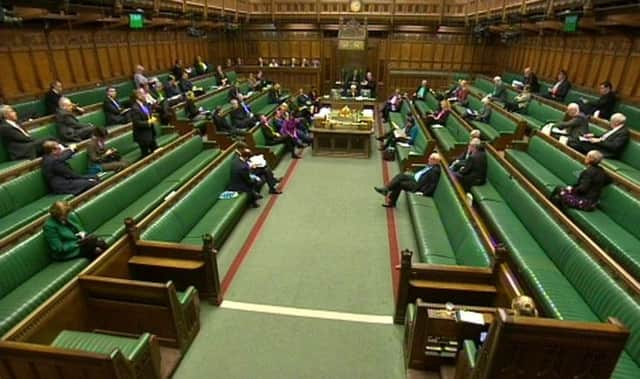‘Three-parent’ babies could be born next year


The historic decision was taken in a free vote after a debate on the controversial issue of “mitochondrial donation” in the Commons.
It means the UK is now set to be the first country in the world to permit the treatment, which according to critics crosses an unacceptable ethical line.
Advertisement
Hide AdAdvertisement
Hide AdIf the House of Lords ratifies the move – which is likely – then the first baby conceived with the procedure could be born by the end of next year.
The child would have “nuclear” DNA determining individual traits such as facial features and personality from its two parents, plus a tiny amount of mitochondrial DNA (mDNA) from an anonymous woman donor.
Research has shown that mitochondrial donation could potentially help almost 2,500 women of reproductive age in the UK.
All are at risk of transmitting harmful DNA mutations in the mitochondria, tiny rod-like power plants in cells, on to their children and future generations.
Mitochondrial DNA is only involved in metabolism and makes up just 0.1 per cent of a person’s genetic code. But faults in mDNA can lead to a wide range of devastating and sometimes life-threatening inherited diseases responsible for conditions including blindness, deafness, muscle wasting, diabetes, heart failure and dementia.
FOLLOW US
SCOTSMAN TABLET AND MOBILE APPS
The MPs voted through an amendment to the 2008 Human Fertilisation and Embryology Act making mitochondrial donation procedures legal for the first time anywhere in the world.
Supporters of the move argued that it would be immoral not to take advantage of technology that can save families from the misery of serious inherited diseases.
Opponents, including church leaders and pro-life groups, warned that the change was being brought about too hastily and marked the start of a slippery slope towards designer babies and eugenics.
Advertisement
Hide AdAdvertisement
Hide AdScientists led by Professor Doug Turnbull at the Wellcome Trust Centre for Mitochondrial Research at Newcastle University have pioneered the techniques and hope to be the first group to offer the treatment.
But first their application must be approved by the fertility regulator, the Human Fertilisation and Embryology Authority (HFEA) which has to be satisfied that the procedure is sufficiently safe.
The legal change means the HFEA is now empowered to grant licences for the treatment, and will carefully consider each application on its merits.
A Wellcome Trust spokesman said: “If its approved by the House of Lords, probably in a couple of weeks, the HFEA and Doug will get together to determine precisely what the application terms should be. We’re still awaiting the results of a couple more experiments from Doug’s lab.
“Then Doug will apply for the first licence which will be looked at on its individual merits. We might be talking about tens of families that could be eligible for the treatment.”